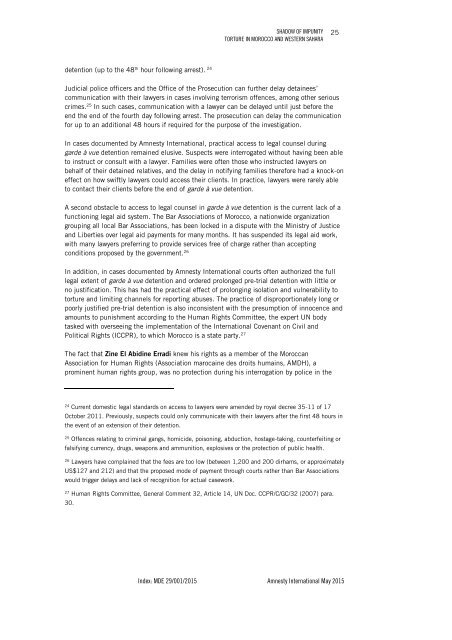7f2vH5qFw
7f2vH5qFw
7f2vH5qFw
You also want an ePaper? Increase the reach of your titles
YUMPU automatically turns print PDFs into web optimized ePapers that Google loves.
SHADOW OF IMPUNITYTORTURE IN MOROCCO AND WESTERN SAHARA25detention (up to the 48 th hour following arrest). 24Judicial police officers and the Office of the Prosecution can further delay detainees’communication with their lawyers in cases involving terrorism offences, among other seriouscrimes. 25 In such cases, communication with a lawyer can be delayed until just before theend the end of the fourth day following arrest. The prosecution can delay the communicationfor up to an additional 48 hours if required for the purpose of the investigation.In cases documented by Amnesty International, practical access to legal counsel duringgarde à vue detention remained elusive. Suspects were interrogated without having been ableto instruct or consult with a lawyer. Families were often those who instructed lawyers onbehalf of their detained relatives, and the delay in notifying families therefore had a knock-oneffect on how swiftly lawyers could access their clients. In practice, lawyers were rarely ableto contact their clients before the end of garde à vue detention.A second obstacle to access to legal counsel in garde à vue detention is the current lack of afunctioning legal aid system. The Bar Associations of Morocco, a nationwide organizationgrouping all local Bar Associations, has been locked in a dispute with the Ministry of Justiceand Liberties over legal aid payments for many months. It has suspended its legal aid work,with many lawyers preferring to provide services free of charge rather than acceptingconditions proposed by the government. 26In addition, in cases documented by Amnesty International courts often authorized the fulllegal extent of garde à vue detention and ordered prolonged pre-trial detention with little orno justification. This has had the practical effect of prolonging isolation and vulnerability totorture and limiting channels for reporting abuses. The practice of disproportionately long orpoorly justified pre-trial detention is also inconsistent with the presumption of innocence andamounts to punishment according to the Human Rights Committee, the expert UN bodytasked with overseeing the implementation of the International Covenant on Civil andPolitical Rights (ICCPR), to which Morocco is a state party. 27The fact that Zine El Abidine Erradi knew his rights as a member of the MoroccanAssociation for Human Rights (Association marocaine des droits humains, AMDH), aprominent human rights group, was no protection during his interrogation by police in the24Current domestic legal standards on access to lawyers were amended by royal decree 35-11 of 17October 2011. Previously, suspects could only communicate with their lawyers after the first 48 hours inthe event of an extension of their detention.25Offences relating to criminal gangs, homicide, poisoning, abduction, hostage-taking, counterfeiting orfalsifying currency, drugs, weapons and ammunition, explosives or the protection of public health.26Lawyers have complained that the fees are too low (between 1,200 and 200 dirhams, or approximatelyUS$127 and 212) and that the proposed mode of payment through courts rather than Bar Associationswould trigger delays and lack of recognition for actual casework.27Human Rights Committee, General Comment 32, Article 14, UN Doc. CCPR/C/GC/32 (2007) para.30.Index: MDE 29/001/2015 Amnesty International May 2015


